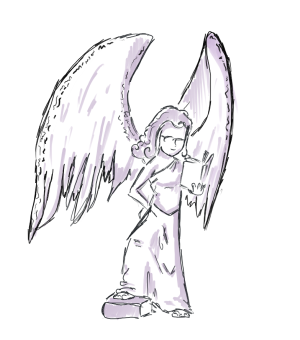That means you're eighteenish. US High School = Oz High School.
Final year of High School = Last year of UK college.
In both cases the next step is university. Or US college.
Ah. But. You. I, what? No. Uh. *haemorrhage of the brain*
Poetry is pure(ish) English.
Poetry is one of the oldest forms of writing and story telling in the world. If you don't understand poetry you can't properly understand English or any other language.
Language in its purest form is poetry:
"We dance in a ring and suppose
The Secret sits in the middle and knows"
That is The Secret by Robert Browning. Everything in it has to do with spelling, placement in the sentence, structure, syntax. Everything.
Why did the poet use "suppose" and "knows"? Was it the sound? Is it the subtle difference between their definitions? Is it that they're part of a lexical set of knowledge?
Does this mean the Secret is knowledge? Who is "we"? Why use the present tense inclusive plural? Why is "Secret" capitalised? Does that anthropomorphise it or tell us it's a real person? Why are "We" moving around the edges? What is so imprtant about the "Secret" that makes it the very centre of all?
ALL English is meaning.
Everything is meaning.
Why does red mean danger?
Why is swearing so taboo?
It's been proven that analysing poetry enables a better grasp on language as a whole, not to mention in some aspects, culture itself. Why is the Iliad so universal that it's been around almost three thousand years? Why Gilgamesh? Why Beowulf? Poetry, whether we like it or no, is endemic of a society, of a culture and of a history.
All schools study poetry. All people know poetry. Song is poetry come again to some of its oldest roots: Bardic songs. Oral poetry with a set rhythm and pieces to enable better recollection of the song or poem.
I can't recall precisely, but if the novel is a glass or orange squash, a poem is orange juice concentrate. That was said by someone.
If you wanted to learn those basics you mention: spelling, definition, and application you shouldn't have taken it at a more developed 'basic' level. The title of the course Basic English shows in a sense just how important poetry is. Nursery rhymes; everyone knows them. They never leave you and they're poetry containing a story. Why does it stick? What's with the language that makes it impossible to forget? Reading into a story is hard not to do. Analysing poetry is using your instincts, and sharpening them to ridiculous levels as you'll see below.
Leaving it at primary in this case would be best. What you want, rather than an education and learning how to analyse anything is a dictionary and a grammar book.
This is the thing I think I have most problems with. Nothing is ever incorrect use of the English language (granted, in other languages with a strictly inflected case system (i.e. German or other Eastern European or Asian languages) or with ideograms reflecting a specific thought and idea (Japanese leaps to mind) there will be 'impossible' or unorthodox uses of language). It is 'non - standard' or 'unorthodox'.
"burgers hair sword yanking" can mean anything. "Sword yanking" - swords are almost inextricably linked with males, the masculine and inevitably the phallus. "burgers" are meat. 'Meat' is also a slang term for the penis itself (coming from the phrase 'meat 'n' two veg') not including the scrotum and other . . . bits. So "hair" could be pubic hair. Hence this 'random' collection of words can be seen as an extremely obtuse metaphor or synecdoche for masturbation.
Alternatively: "burgers" - this is the plural form of a concrete noun. It is still meat.
However, "hair" is in the singular with no use of a pronoun to indicate whether the "burgers" own it, or are doing something to it. "sword" is also singular, possibly indicating perhaps an unusual neologism of a "hair sword".
So is the "sword yanking" itself out of the burgers? In that case, who is holding the sword, why did they attack the burgers? Are they maybe some kind of activist vegans/vegetarians? What is the story behind how the sword is made of "hair"? Is it only the hilt bound in hair? This seems likely, but if the entirety of the sword is made of hair, why?
Nothing has no meaning.
You don't object to studying novels, short stories or books do you? I bet you've read and loved at least one of the following: LoTR, Harry Potter or Discworld. How do you know what's happening without the subtle hints and meanings you read into the text?
Poetry is an extremely condensed form of a book. By having a form and in some case a limit to lines, syllabes per line and other limits it makes the author apply with more finesse the intricacies of a complex language where one word can mean one hundred things depending on its placement in a sentence and every other word in the sentence, the sentences surrounding it and every other word in the entire thing.
And so ends my impassioned plea on the worth of studying poetry. P.S. I don't even like poetry very much.
DISCLAIMER: I may not have gotten The Secret entirely right. It could be 'dance in a circle and suppose'.
View Single Post
-
2009-09-07, 02:13 PM (ISO 8601)Firbolg in the Playground


- Join Date
- Apr 2007
- Location
- The Black Desert
- Gender

 Re: Thanatos's Tharmturges Present: Tropical, Tipsy, and Typically Random Banter #127
Re: Thanatos's Tharmturges Present: Tropical, Tipsy, and Typically Random Banter #127
Last edited by CurlyKitGirl; 2009-09-07 at 02:21 PM.
Bathatar!
Squid bones are lies.





 Reply With Quote
Reply With Quote